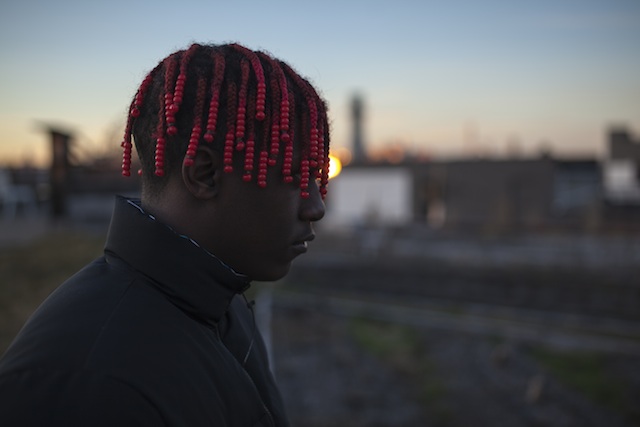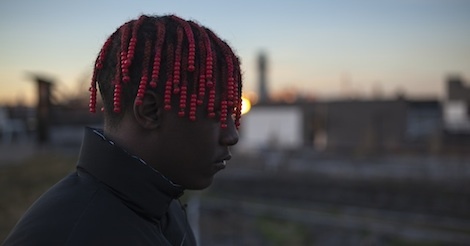Lil Yachty, left, on Snapchat / Photos by Daniel Brothers
I can’t believe it, but I’m explaining memes to the 18-year-old rapper Lil Yachty: “Wait, are memes and GIFs two different things?,” he asks me to clarify. It’s not that Yachty, whose music career has exploded in the last two months in part with a huge boost from a viral video, doesn’t understand memes; rather, the language of online sharing and the hyperbolic enthusiasm that comes with it is so baked into the way he communicates it seems beside the point to dissect it. Moments earlier, telling me about his upcoming mixtape, which is coming out “so soon,” he quips, in what might as well be an fire emoji-laden tweet, “Guarantee you’re gonna have to wear oven mittens when you download it.”
Videos by VICE
Yachty’s claim probably deserves the benefit of the doubt. In just the last couple months, the Atlanta artist has become one of rap’s most buzzed-about new names, an avatar of the genre’s contemporary, unmoored sound and visual aesthetic with a dizzyingly fast-growing listenership and a growing roster of clutch industry connections. His new manager Coach K—who previously managed Young Jeezy and Gucci Mane, and also manages Migos—claimed that Yachty’s Soundcloud has been getting 400,000 plays a day, putting him among the service’s most streamed artists globally.
That seems plausible, given that his biggest hit, “1Night,” has been played nearly 1.5 million times just in the last week, in the same neighborhood on the service’s charts as recent songs from Kanye West and Future. Oh, also, speaking of Kanye, Yachty recently posed as one of the most prominent models in Yeezy’s Madison Square Garden fashion show, his distinctive red-beaded hair matched to a red sweatshirt, quite literally an icon for the youth.
Alongside similarly young, social media-adept artists like Playboi Carti and Lil Uzi Vert, Yachty is making music that feels native to the internet and the artsy kids who comb its new trends with hyperactive intensity. He is unmistakably young: When he visited the VICE office recently he answered questions alternating between the shy, bored reserve of a kid being called on in class and the youthful enthusiasm of a teenager full of creative ideas in a new setting. He describes a half-dozen things— from VHS tapes to the Yeezy fashion show to surviving for a summer in New York with an EBT card—as “lit” and offers suggestions for how to embellish a video of our interview with floating giant boat emojis.

Yachty’s music is a swirling mixture of texture-heavy, melodic, post-regional sounds deeply indebted to the breakthrough sonic playfulness of recent predecessors like Chief Keef, A$AP Rocky, and Young Thug. Yet while his peers stand out with heavy drums and sing-along turn up anthems, Yachty’s sound veers more abstract, often with a bright and almost a cartoonish quality. In some cases, it is literally that way, such as on the recent “All Times,” which interpolates the theme music from the Nickolodeon show Rugrats. Many of his songs sound borderline unfinished, but they also have a warm, off-kilter beauty to them. “1Night,” a mumbled sing-song riff on keeping a relationship casual, is over production Yachty described as “a snippet beat… not even a real beat,” but its charm comes from the way it sounds almost like a rambling voicemail punctuated by gorgeous, swooning Auto-Tuned vocals that dip through the background. “Water on My Face,” perhaps Yachty’s best song, riffs on rap tropes about jewelry and girls in a semi-bored, intermittently Auto-Tuned sing-along over a sparkly beat from The Masked Jerk that sounds like someone synced a drum machine to a rinky-dink elementary school science video.
“It’s not like I’m a hardcore rapper,” Yachty explained. “I do, like, bubblegum trap beats.” Much of the credit for that sound falls on producers like Burberry Perry, who made the beat for “1Night” and who has a fascinating if small rap catalog of his own. “I always thought it was if you sat down and you watch Powerpuff Girls or something like that, and you try to throw that on trap drums, so it could be bubblegum trap, I guess you could say that,” Perry added. “But for me, personally, I just always try to make it happy. I always make happy music, or try to like put core emotions into it.” The two only met about a year ago through a mutual friend, when neither had much going as far as music. They’re a natural pair: Yachty is the more outwardly animated one, while Perry is quieter and more sardonic, but both are winningly genuine.

Yachty, left, and Burberry Perry, right
“I remember him saying he was a producer,” Yachty said. “And his friend is like, ‘nah, you don’t want to hear his beats, his beats suck. They’re not good.’ I said, ‘so play it.’ And he played the beat, and it was like the best beat I ever heard.” Perry, who started out making beats on rudimentary web software and has since graduated to the semi-sophistication of FL Studio, riffs quickly on ideas—he made the “All Times” beat in eight minutes—and comes up with the melodies for many of the songs the two work on together. Yachty credits Perry for exposing him to an 80s retro pop sound and helping him discover and tap into the aesthetic that he then sought out for songs like “Water on My Face” or “Minnesota.” Perry credits Yachty for having the vision: “I don’t want to say nobody liked [my sound], but nobody gravitated to it until I met Yachty. Yachty’s the only one who really picked up on it. ‘Cause like I said, our mutual friend, he used to say that my music sucked, or my beats sucked. All the beats didn’t suck: They ended up being—they’re really popping.”

To get popping, Yachty had a plan that’s both sophisticated and likely to send adults into a tailspin of panic about how the world works these days. As a high schooler growing up in the West Side Atlanta suburb of Mapleton, he was drawn to cool clothes and photography—his dad, who spurred his love of music and bands like Coldplay, is a photographer who has worked with many of Atlanta’s biggest musicians. But Yachty began making parody songs on his computer, and his interest in music grew. By his senior year of high school (which, incidentally, was last year), determined to make it with music, he drew up a plan to spread his brand. Among his goals were to have a song with a viral video—inspired by the memetic success of OG Maco’s “U Guessed It”—and to get to know some of the coolest kids with the biggest online followings, who could then share his songs. He’d met Ian Connor—the Instagram fashion celebrity, occasional muse of Kanye West and A$AP Rocky, and now manager of Playboi Carti—in the airport the year before and they’d traded numbers after Ian had been impressed with Yachty’s Supreme coat. When Yachty graduated high school, he moved to New York for the summer to crash on a friend’s couch and try to get into the type of fashion circles influencers like Ian ran in.

“I mapped out all of the core internet kids, like popular kids that I wanted to meet, ’cause I knew if I met them, I could get them to distribute my music,” Yachty said. “’Cause the cool kids have all the cool followings. Everyone looks up to them, you know what I mean? Whatever they’re doing is cool.” With his red, beaded hair—a style he adopted at the encouragement of his mom, who’d originally made him cut his braids so he could get a job at McDonald’s—and sharp fashion sense, Yachty stood out and made those connections. But he didn’t have the buzz to really make money and support himself in New York. At his mom’s urging, he went back South and enrolled in college at Alabama State. He hated it.
“It’s the South, and it’s the country, so they’re like five years behind,” he explained. “Like they all still wearing big T-shirts and baggy jeans. I had red hair with beads. I wear different clothes. They just used to make fun of me, like every time I stepped out of my room. So it got to a point where I stopped stepping out of my room. I just stayed in my room every day.” He would wear hoodies in the 90-degree heat to cover up his hair, but he was still pointed and laughed at in the cafeteria. “You know when you can feel somebody trying to take a picture of you?” he added. “It was lame.”
Discouraged by the bullying and bored with classes, Yachty dropped out and returned home, where he followed the same plan he’d cooked up in New York: “I started getting so known, you know what I’m saying, for the way I dress, for my teeth, you know, I got a grill,” he explained. “Everything, just my hair, girls started liking me.” Then, at the very end of 2015, he caught a break, in the form of a joke video that went wildly viral on Twitter. Suddenly, he was seeing a million plays a day on Soundcloud, and good opportunities kept arising. Connor introduced him to A$AP Rocky, who has become a huge fan, and took him to New York for the Yeezy fashion show. He’s found himself enthusiastically covered on music blogs and in the pages of the New York Times, held up as a model of the Snapchat and Instagram era of rap.

It’s not hard to see why Yachty embodies that idea for so many people, beyond his own astute approach to engineering his rise. Artistically, he’s like a younger, slightly more focused version of the pioneering viral rap stars of a half-decade ago—Lil B, Riff Raff, TKO Capone—whose music threw wacky, unpolished ideas out to see what would stick. The images accompanying many of his songs are bad, candid photos that highlight his hairstyles and oufits—the cover for the collection containing “1Night” looks like a Snapchat screengrab. And his music, at its most fascinating, veers well off the now relatively safe path of woozy, washed-out trap melodies into odd discursions and vocal experiments, although always with a positive, upbeat underpinning. In some cases, his songs become almost ambient compositions, as on the transcendent “Remember December.” The internet’s promises have long been to connect people, make information more accessible, and remove traditional gatekeepers; the floodgates have broken, and Lil Yachty is sailing those waters with skill.
Kyle Kramer is an editor at Noisey. Follow him on Twitter.
More
From VICE
-

-

(Photo by Amy Sussman; JOSEPH PREZIOSO/AFP via Getty Images) -

(Photo by Westend61 / Getty Images)

